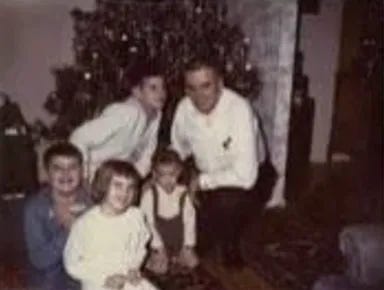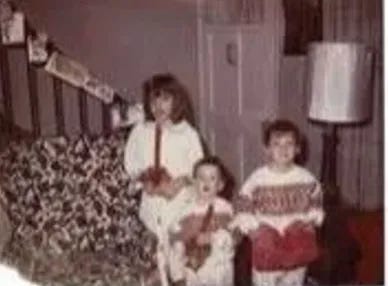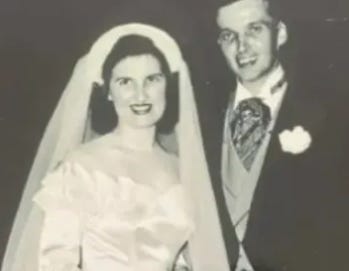The Ghost of Christmas Past
I never saw my father happier than at this time of year. But as he aged, much of the rest of the year often seemed an earthly purgatory.


More than four decades after he left this Earth, I can still see my father best at Christmastime.
There he is, hunched over the wires of the train garden in our living room, sparks flying while he hooks up the transformer so we can make the trains go fast and slow and belch steam as they lumber over and through the mountains and past the U.S. Post Office and the Texaco station and the church and the tiny houses surrounded by felt green grass. Lights shine in the windows of the houses and along the trolley line and inside the passenger cars of the trains. My father’s ever-present Winston glows, and his opalescent blue eyes twinkle, at least in part due to the consumption of significant quantities of National Bohemian Beer.
This is back in the 1960s and 1970s, when the Hoffbergers of Baltimore brewed the beer, and Jerry Hoffberger owned the Orioles (and would during by far the most successful years in the team’s history), and he had “10-cent beer nights” at the old Memorial Stadium.
For us, each Christmas season began after dinner on Thanksgiving evening, with our annual trip to Edmondson Village Shopping Center in West Baltimore. When the thousands of clear white lights in all the trees and on the storefronts flashed on all at once, my father could hardly contain his excitement. His face would grow flush, his eyes glistening.
“Look, Pal! Look at those lights! Can you believe it? I’m telling you. Have you ever seen anything like it?” He put his arm around me as I sat in the “tut seat,” the fold-down armrest of a brand-new Buick LeSabre from Brooks Buick in suburban Baltimore, where he was sales manager. That year had been a good one in the car business.
Then, early on Christmas morning, three of Dad’s five children would parade down the steps of our house, one cradling the baby Jesus in a blanket for the trip to the stable under the tree, others holding lit candles. I suspect the “Jesus Parade” goes back to at least my father’s childhood home in the West Baltimore community of Irvington, but nobody’s sure. Whatever its origins, I never saw the old man more content than during our annual family ritual. He would film it all with a two-foot-wide movie camera that had two blinding spotlights, and just seeing those lights made you believe in miracles. What else could explain all those stars dancing in your eyes as the colored Christmas tree lights reflected off the gaudy silver garland laid on heavy?
We then indulged in American consumerism on a grand scale, for Bernard Patrick Gately Jr. was nothing if not Madison Avenue’s dream come true. Christmastime was and always would be his time at 7202 Barlow Court, the house with a backyard bordering a field full of dairy cows in Chadwick, the new suburb in Woodlawn, where he’d moved us from a West Baltimore rowhouse when I was still an infant.
Always, on Christmas, we found piles of gifts stacked at least a few feet deep: electric football, a talking football game, a fire helmet with a built-in microphone, Sizzler racing car sets with loop-to-loops, a fire truck you could drive, the first toy machine that pitched plastic balls so you could bat them, a catcher’s mitt, a baseball pitch-back, hockey sticks and pucks and skates. One year, my mother, Margaret Donohue Gately, got a new yellow Buick convertible with a black leather interior as a Christmas gift.
The money seemed to have flowed as freely as the alcohol had in the family since my father’s grandfather, Thomas James Gately, came to Baltimore from Ireland’s County Roscommon in 1866 and promptly opened a pub on West York Street about three blocks west of where the Maryland Science Center now stands in Baltimore’s Inner Harbor. But even when the money stopped coming, even when he was between jobs, my father would rack up obscene credit card debt, and the stacks of gifts would still magically appear.
As I got older, I loved Christmastime for all it was and for all it wasn’t. At Christmastime, I felt like we were a real family, even though my parents no longer slept in the same room by the time I was 5. Christmastime meant none of the screaming matches between my mother and father that came more and more frequently as his drunken rages worsened when he began suffering the slow drowning alive that is emphysema.
For if Barlow Court at Christmastime could resemble scenes in “It’s a Wonderful Life,” we saw the angry and heartbroken George Bailey show up more than occasionally the rest of the year.
He would sit in the back pew of church alone, and I would hear him coughing loudly. By then, Our Lady of Perpetual Help had moved into a modern brick building, and my father couldn’t get over the fact that it had no large crucifix, as the old white chapel it replaced had, and that hippies played “Let It Be” on acoustic guitars at the post-Vatican II Masses. (It must be said, though, that my father couldn’t resist timing the OLPH Masses celebrated on Colts home game Sundays by Father Marty, a season-ticket holder, whose best time came in at 28 minutes.)
In the years after Mom began sleeping upstairs, my little brother, David, and I slept in a twin bed next to my father in the first-floor master bedroom, and every night he prayed aloud with us. During prayers, he would take a break from puffing on Winstons, but he could still cough a half-hour straight after years of chain-smoking in a business where smoking and drinking were as endemic as on “Mad Men.” We began, “Now I lay me down to sleep, I pray the Lord my soul to keep…." before asking God’s blessings and mercy for our family and praying for the poor, the hungry, the homeless, the sick, the victims of war and the suffering souls in Purgatory.
Some nights after prayers, my father would start talking dreamily, and his voice would get a little higher-pitched. The Winston glowing when he dragged on it would light up his face, and he’d speak of going back to Ocean City, Maryland, the whole family staying together again at the Westward Ho or the Yankee Clipper, catching the waves, riding the boardwalk train, crabbing at dawn, eating at Phillips Crab House. When I was a baby, my family still went downy-oshin (in Baltimore parlance) every summer. But I had only faint memories of those beach trips and knew about them mostly because I had seen the home movies, the black-and-white snapshots and the early color Polaroids.
Growing up, the closest I came to those trips was when my father would drive my Mom, my big sister, Mary, and little brother, David, and me in a brand-new, smoke-filled car to The French Quarter (now a Days Inn) a block off the boardwalk at 22nd Street in Ocean City. I prayed so hard that he would stay, but he’d drop us off then turn around and head home. Other times, my mother took her younger children to the beach on a Trailways bus or in a bright orange Pontiac Ventura that overheated one summer, leaving us stranded for hours on a dark stretch of Route 50.
When we prayed with my father, he would tell us that God listens especially closely to the prayers of young children, and he’d ask us to please pray hard for him because he was in the doghouse. This usually meant too many bills and no work. Even then, I knew that he was suffering an earthly purgatory long before his death. It got so bad at one point that he was driving a cab — my mother worried somebody would shoot him in those scary days after the 1968 race riots — and instead of coming home in a new Buick or Pontiac, he pulled up to the house in a beat-up black Chevy. Often, during hard times, he would utter one of his favorite prayers, by turns, an act of faith or a plaintive plea that began: “With the help of the Lord….”
When we buried him at New Cathedral Cemetery on a gray April day in 1979, I felt like I hardly knew the father my older brothers and my mother had known. By the time he died at 59, he and my mother had been divorced for five years. In those last years, he’d show up on Christmas at our tiny townhouse where my mother shared one bedroom with my sister and my little brother and I shared the other. Nobody ever suggested continuing the Jesus Parade at 6 Balset Court. It could never be the same. Already by then, my father had become the ghost of Christmas past, the twinkle in his eyes replaced by a sad gaze looking out from a face hollow and gaunt.
Sometimes I feel guilty that at the time I didn’t try to imagine how much it must have hurt him, seeing it all fall apart. But looking back, I think it took me decades to even begin to try to grasp what it could have felt like. I couldn’t see past this boy’s life’s anger and heartbreak and tears. In some ways, I realize now, we all inevitably come to know our parents better in death than in life.
When I gaze at the black-and-white photos and the color Polaroid shots of him in his prime, a familiar pang gnaws at me: How I wish I had known the hulking, dashing man from Irvington. It is said that in his younger days, before he got sick, he could hold his own with the best of them on the ball fields of his alma mater, Mount St. Joseph High School. And later, he could work a party or an auto showroom floor with equal panache and polish. He was also known to express inappropriate delight in espousing contrarian views. His Irish kin, among others, would try to fathom the unthinkable: how my father, an Irish Catholic, could publicly proclaim this new president, Jack Kennedy, greatly overrated.

If he had the Irish tendency to drink to his detriment — he was an on-again, off-again member of AA, though never a fall-down drunk (and sober his last three or four years) — he also had the Irish talent for talking with anyone about anything. He had a knack for convincing everyone he spoke to that almost nothing else in the world mattered at that moment but what they were saying. He knew many of the old Baltimore Colts, who bought vehicles from him, and advised Gino Marchetti to stick to football, what he knew best, and stay away from this new hamburger venture with Colts teammate Alan “The Horse” Ameche, which became the Baltimore-based fast-food fixture Gino’s. For the record and progeny’s sake, my father also predicted — correctly, it turns out — that if somebody could bottle that new-car scent, the smell of success in post-World War II America, lots of people would buy it.
As the years go by, and so much of who my father was slips from memory, I cling to and try to pass along to my sons stories of the grandfather they never knew. I tell Joseph, 22, and Paul, 18, about my dad’s infectious joy this time of year and his faith, which was a childlike faith in the end, as all faith that is real must be.
I tell them about sitting in his new car in Edmondson Village, where the clear white lights magically turning nighttime into day created an instantaneous wonderland that now makes me think wistfully of the line from Baltimorean Barry Levinson’s movie “Avalon”: “If I knew things would no longer be, I would have tried to remember better.” I tell my sons about the annual Jesus Parades at Barlow Court and about their grandfather in heaven, a man I never saw happier than he was at this time of year.
Right then, I him see him, my father on Christmas Day. He’s sitting with his legs crossed, the blue plaid robe over his pajamas, pointing a long, bony finger at the steam pouring from a model train engine, dragging on a Winston.
There’s this faraway look in his Irish eyes that shine clear to his soul.
And he’s smiling, for it is Christmastime.




Beautiful memories. Purgatory leads to only one place. Like us all, your dad did the best he could. The Lord understands and is merciful Thanks for sharing.